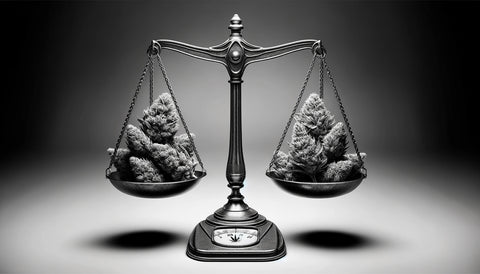The legal status of hemp-derived cannabinoids like THC-O acetate has sparked confusion and debate across the cannabis industry. While compounds like delta-8 THC have gained popularity for their psychoactive effects, their legality has been questioned, particularly by the DEA. Recently, a landmark decision by the U.S. Court of Appeals for the Fourth Circuit clarified the standing of THC-O acetate under the 2018 Farm Bill, offering a new perspective that challenges the DEA’s classification of the compound as a Schedule I controlled substance.
In this blog, we’ll dive into what THC-O acetate is, how the recent court ruling affects its legal status, and what this means for hemp industry stakeholders. If you’ve been following the evolving legal landscape of cannabinoids, this is one decision you don’t want to miss.
The 2018 Farm Bill and Cannabinoid Legalization

The 2018 Farm Bill was a game-changer for the cannabis industry, legalizing hemp and its derivatives, provided they contain less than 0.3% delta-9 THC. This opened the door for various hemp-derived cannabinoids to enter the market, including delta-8 THC and, more recently, THC-O acetate. These cannabinoids have become popular for their ability to produce effects similar to those of THC without exceeding the federal limit on delta-9.
However, the bill’s language left some gray areas, particularly when it comes to cannabinoids created through synthetic processes, like THC-O. This legal ambiguity has led to debates on whether these compounds are truly legal or if they fall under the DEA’s restrictions on synthetic substances.
The DEA’s Stance on THC-O and Synthetics

The DEA has long maintained that synthetic cannabinoids, like THC-O acetate, do not fall under the Farm Bill’s protection. In February 2023, the DEA issued a letter clarifying its position that THC-O does not naturally occur in cannabis plants and can only be produced synthetically. As a result, the DEA considers it a Schedule I controlled substance, which puts it in the same category as drugs like heroin and LSD.
The core of the DEA’s argument is that the legality of hemp-derived products under the Farm Bill applies only to compounds that occur naturally in the cannabis plant. Since THC-O must be synthesized in a lab, the DEA has argued it should not be treated the same as naturally derived cannabinoids like CBD or even delta-8 THC.
The Fourth Circuit Court’s Ruling
Recently, the U.S. Court of Appeals for the Fourth Circuit weighed in on this issue, providing much-needed clarity. In a ruling that contradicted the DEA’s position, the court found that THC-O acetate, despite being synthetically derived, can still be considered legal under the 2018 Farm Bill as long as it meets the THC content threshold of 0.3% delta-9 THC or less.
The court’s decision mirrors a previous ruling by the Ninth Circuit Court, which similarly found that hemp-derived cannabinoids like delta-8 THC are federally legal, even if they undergo synthetic processes. This ruling signifies that, in states under the Fourth Circuit’s jurisdiction, THC-O is now legally protected, and the DEA’s interpretation is not binding in this context.
Key Takeaways from the Court’s Opinion

The court’s opinion represents a major victory for producers and retailers of hemp-derived cannabinoids. It not only solidifies the legal status of THC-O but also sets a precedent for the broader interpretation of the Farm Bill, opening the door for other synthetically derived cannabinoids to gain legal recognition, provided they meet the necessary delta-9 THC limits.
Another crucial aspect of the ruling is the court’s rejection of the DEA’s authority in defining what constitutes legal hemp. The court emphasized that the DEA’s opinion on hemp derivatives holds little weight unless it aligns with the clear language of the Farm Bill. This is a significant win for the hemp industry, as it limits the DEA’s ability to enforce its interpretation on cannabinoids that technically meet federal law standards.
What This Means for Hemp Industry Stakeholders
For businesses involved in the production and sale of THC-O and other hemp-derived cannabinoids, this ruling is a breath of fresh air. It provides legal clarity in states under the Fourth Circuit’s jurisdiction, allowing manufacturers to move forward with confidence that THC-O products can be sold without federal interference—as long as they adhere to the 0.3% delta-9 THC limit.
That said, the ruling does not necessarily guarantee smooth sailing for THC-O products across the U.S. States outside of the Fourth Circuit’s jurisdiction may still enforce their own bans or restrictions on synthetic cannabinoids, and the DEA can continue to challenge these compounds in courts elsewhere.
Practical Implications: Will Anything Change?

Despite the legal clarity this ruling provides, it’s unlikely to lead to a massive shift in the hemp industry’s focus. Many manufacturers have already started moving away from synthetic cannabinoids, concentrating instead on naturally occurring compounds like CBD, CBG, and CBN, which face fewer legal challenges. Innovations such as THCa, found in products like the Ari53™ Diamond-Infused Flower, are also gaining traction as hemp-derived alternatives that can offer consumers unique experiences while staying within the bounds of federal guidelines.
However, the court’s decision still carries significant implications for the long-term future of the hemp industry. It shows that the courts are willing to interpret the 2018 Farm Bill broadly, offering a legal pathway for other synthetic cannabinoids to gain recognition. This could open up new opportunities for innovation in the cannabinoid space, particularly for compounds that don’t occur naturally in the plant.
Conclusion: The Future of Hemp-Derived Cannabinoids
The Fourth Circuit Court’s ruling on THC-O acetate is a pivotal moment for the cannabis and hemp industries. It not only reinforces the legal status of THC-O but also challenges the DEA’s restrictive interpretation of the 2018 Farm Bill. For businesses and consumers alike, this ruling signals a new era of legal clarity for hemp-derived cannabinoids—synthetic or not.
As the legal landscape continues to evolve, it’s important for industry stakeholders to stay informed and prepared for future developments. With rulings like this, the future of cannabinoids looks bright, and the possibilities for innovation seem endless.


